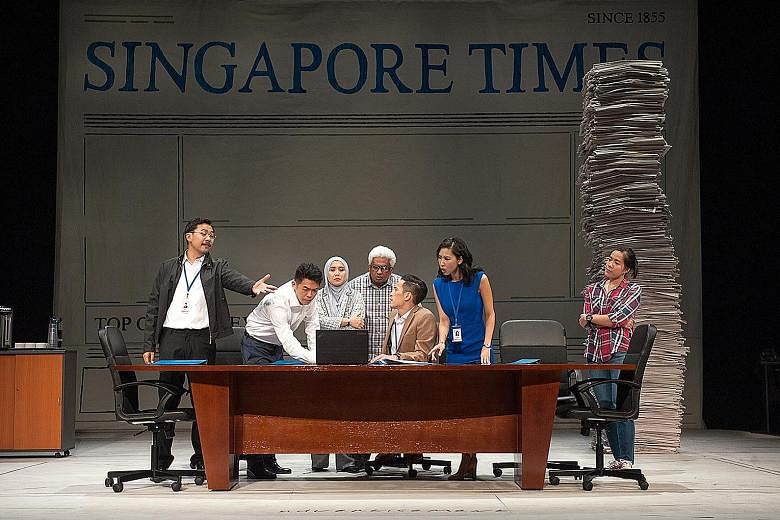REVIEW / THEATRE
PRESS GANG
Wild Rice/Singapore Theatre Festival
Singapore Airlines Theatre, Lasalle College of the Arts/ Tuesday
In this play written by former journalist Tan Tarn How, an associate editor at the fictional Singapore Times asks: "Why be a journalist?"
For a new hire formerly from the civil service, Chua Kin Jek, journalism means "more work, less pay, less respect". The character played by Benjamin Chow sees the job as a way to help people. He cares, but not enough to be a bleeding-heart activist.
For a well-known columnist, Kerin Khoo, played by Amanda Tee, what drives her is seeing her byline among the most-read stories online and the chance "to make people feel a little".
-
BOOK IT / PRESS GANG
-
WHERE: The Singapore Airlines Theatre, Lasalle College of the Arts, 1 McNally Street
WHEN: Till Sunday; 7.30pm (today to Friday), 3 and 7.30pm (Saturday and Sunday)
ADMISSION: $60 and $75 from Sistic (call 6348-5555 or go to www.sistic.com.sg)
INFO: Advisory 16 (mature content). Go to singaporetheatrefestival.com
For a stalwart on the verge of retirement, Bhavan Muthu, played by T. Sasitharan, "journalism matters". It makes a difference in people's lives, albeit in a small way.
Newspapers matter.
Words online can be tweaked or taken down, but the printed record endures even when people forget what was printed and when.
A tower of newspapers emphasises these points in this new play directed by Ivan Heng. The tower is a fixed element in the set, even as desks and chairs are moved around to form offices and conference rooms for furrowed-brow editors (set design by Chris Chua). It doesn't fall. It is ignored by the actors. But it is a reminder that newspapers may chase after the present, but they record and are defined by history.
Playwright Tan mines his own history for this play. He worked at The Straits Times from 1987 to 2005, including as a political reporter and arts deputy editor, and had said that he thought of the script soon after leaving the newsroom.
Accuracy is not the point of the text, as theatre can afford to exaggerate or amalgamate events and personas to illuminate truths. So this fictional newsroom is left unable to act on a red-hot rumour that the prime minister's son has slapped the deputy prime minister for daring to question his actions. This parallels the play's oft-stated assumption that neither Singapore's newspapers nor independent news bloggers dare to challenge the authorities for fear of being slapped down.
In this fictional newsroom, a single journalist is tasked to work on the story in secret, rather than having teams of reporters and editors across desks sharing resources, as is usual for major stories such as the National Library Board's withdrawal of children's books for alleged adult content (2014) or the recent Trump-Kim summit.
But without this leap, Chow's character would not be able to introduce viewers to the various players in the newsroom as he works the story. There are feuding editors played by Shane Mardjuki and Oniatta Effendi, and the snide associate editor played by Rei Poh, who only attends meetings, writes nothing and is rumoured to be a spy for the government. All paper-thin cut-outs with no obvious motivations.
Press Gang is a disappointingly heavy-handed play from a writer who tackled the subject of self-censorship brilliantly in Fear Of Writing (2011). Half the cast declaim their lines rather than inhabit their characters. Too much is spoken about the limits of free speech when it could have been shown in action or even costume - for example, The Necessary Stage's 2016 play about artistic censorship, Manifesto, used flowing or tightly buttoned garb for this purpose.
Thankfully, Tee and Sasitharan anchor the play with characters that have actual personality. Tee's columnist is warm, driven and a victim of her own success. And Sasitharan's return to acting after 20 years is a triumph.
One wishes this play had been more about Bhavan and his kind. Viewers are invested in the journalists on stage, who feed the printing press with story after story, only to be discarded like yesterday's news.
Yet they keep coming, the reporters and editors, in service to the truth and accuracy, and making people feel a little. In ending with a tribute to all the journalists behind any newspaper, Press Gang finally gets it right.


